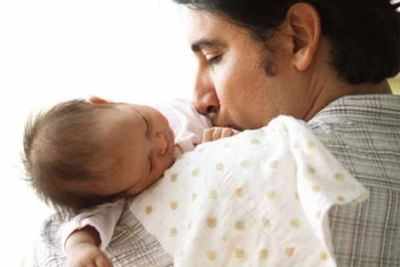- News
- lifestyle
- relationships
- love-sex
- Sad Dads!
Trending
This story is from January 20, 2015
Sad Dads!
Men, too, are susceptible to postpartum depression, says a new study. How does the modern father cope with panic attacks and depression that are crippling his life?

Men, too, are susceptible to postpartum depression, says a new study. How does the modern father cope with panic attacks and depression that are crippling his life?
Dentist Dr Himanshu Mehta, 27, had panic attacks when he became a new dad. His bouts of withdrawal were so severe that he had to quit his job. He isn't alone in his suffering. According to a recent study, the new daddy is getting the baby blues.Postpartum depression, so long associated with women, is hitting first-time fathers too! A research published in the journal, Pediatrics, says that men, who become fathers around the age of 25 have a 68 per cent increase in depression symptoms over the first five years of being dads. Says Dr Mehta, “The first few days were the worst, I simply couldn't cope. We had no family to help us. My wife was equally disturbed with the changes. We were both at sea.“
According to the author of the study, Dr Craig Garfield, a professor of paediatrics, “Men, like women, need emotional help when they be come dads. For suffering men, the symptoms go unnoticed and unaddressed.“
Ricky Shetty, a father of two, struggled so much with the changes in his life after he be came a father, that he decided to help out fellow dads by penning a book called Wisdom from Daddies. “A lot of new fathers feel sad, low and depressed be cause of the extra financial burdens, the effects of a child on their marriage, less consistent sex, and added responsibilities,“ says Shetty, who also writes on `Daddy Blogger'. “Young new dads are usually under a lot of stress as the husband-wife relationship undergoes a sudden and massive change they aren't prepared for.“
The Journal of the American Medical Association reports that depression was highest among fathers with infants aged three months and six months. These young fathers were overcome by a feeling of worthlessness, loss of interest in their spouse, and activities that used to bring them joy earlier. They complained of consistent sleep disturbances, low energy and sadness. Psychiatrist Dr Avdesh Sharma says, “In today's context, extended family support is almost nil and hence the pressure that the man wasn't used to. Fatherhood also brings with it a curtain to the past carefree life one usually leads. Young fathers, especially, can't cope with this feeling.“ Young dad Chandru Bhojwani says, “With the coming of a child, a man's free lifestyle radically and dramatically changes.Men feel they're forced to suddenly give up a lifestyle they weren't ready to and can be resentful towards the wife who may be the one insisting on his presence.“
Bindu Sharma, an HR executive couldn't fathom her husband Neil's mood swings and sudden fits of rage right after the birth of their son. “We both wanted this child, we were ecstatic when he was born, but something changed very quickly after that. Neil's behaviour went from bad to worse. Here, I had gone through all the pain -physically and psychologically -of childbirth and I kept on thinking, why is he behaving like a jerk?
Then, I read up on postpartum depression in men.It's not easy for either parents. I decided to talk it out with him, and things have started looking up from there onwards.“
Gynaecologist Dr Archana Dhawan Bajaj explains, “The low energy, changes in sleeping and eating pat terns, reduced desire for sex, crying episodes, anxiety, and irritability, results in postpartum depression among both the mother and father.The pressure's more on nuclear families that have no support system to cope up with baby care. It incites a kind of anxiety in men that they don't understand, unlike work pressure, which they can handle. They feel their lives are out of control and become un predictable and de pressed; it causes the male testosterone levels to drop. The estrogen, prolactin and cortisol levels go up, which causes stress. However, male postpartum de pression is more psychological than biological.“
Says Neil Sinclair, author of Commando Dad: Raw Recruits, be “As a commando, I served in the Gulf War but I would still count being a new dad as the most stressful time of my life.You are handed your baby, a completely new person that you helped create and love unconditionally, and the thing you want to do most in the world is look after and protect him/her. But you're not really too sure how to.“ In addition, dads often have to deal with the belief that they are not natural carers because they are `men'. Adds Sinclair, “If men feel anxious about their ability to cope, they are not very likely to look for support and will suffer in silence because of the stereotype that we are the `strong' ones.“
This depression in men isn't a consistent sadness but more of an emotional swing from being extremely happy to being extremely unhappy. Bobby Mehta, 29, who has a 15month-old son, says, “Our routine was changing every minute and I couldn't cope with all the massive changes in so little time. Also, I didn't want to burden my wife with my insecurities, so I'd bottle them up.“
PLAYING `MOM ROLES'
The shift of postpartum stress from mother to dad also comes from the changing expectations from men to be caring and compassionate fathers and husbands. With a lack of a clear-cut division of labour as existed in our parents' time, more dads are fulfiling tasks that were once `mom roles' They are changing nappies and feeding their babies. Rob Kemp, author of The New Dad's Survival Guide, says, “We're learning to find a balance between the demands of work and the expected role of fatherhood. Many dads want to do it all be the breadwinner, the support for his wife as she deals with motherhood and be a participant father. When they fail to achieve them all, they suffer from the same anxieties that a mother does.“
The modern man's road to being Daddy Cool seems tough. Talking about it is a good start.
Dentist Dr Himanshu Mehta, 27, had panic attacks when he became a new dad. His bouts of withdrawal were so severe that he had to quit his job. He isn't alone in his suffering. According to a recent study, the new daddy is getting the baby blues.Postpartum depression, so long associated with women, is hitting first-time fathers too! A research published in the journal, Pediatrics, says that men, who become fathers around the age of 25 have a 68 per cent increase in depression symptoms over the first five years of being dads. Says Dr Mehta, “The first few days were the worst, I simply couldn't cope. We had no family to help us. My wife was equally disturbed with the changes. We were both at sea.“
According to the author of the study, Dr Craig Garfield, a professor of paediatrics, “Men, like women, need emotional help when they be come dads. For suffering men, the symptoms go unnoticed and unaddressed.“
Ricky Shetty, a father of two, struggled so much with the changes in his life after he be came a father, that he decided to help out fellow dads by penning a book called Wisdom from Daddies. “A lot of new fathers feel sad, low and depressed be cause of the extra financial burdens, the effects of a child on their marriage, less consistent sex, and added responsibilities,“ says Shetty, who also writes on `Daddy Blogger'. “Young new dads are usually under a lot of stress as the husband-wife relationship undergoes a sudden and massive change they aren't prepared for.“
DADDY BLUES
The Journal of the American Medical Association reports that depression was highest among fathers with infants aged three months and six months. These young fathers were overcome by a feeling of worthlessness, loss of interest in their spouse, and activities that used to bring them joy earlier. They complained of consistent sleep disturbances, low energy and sadness. Psychiatrist Dr Avdesh Sharma says, “In today's context, extended family support is almost nil and hence the pressure that the man wasn't used to. Fatherhood also brings with it a curtain to the past carefree life one usually leads. Young fathers, especially, can't cope with this feeling.“ Young dad Chandru Bhojwani says, “With the coming of a child, a man's free lifestyle radically and dramatically changes.Men feel they're forced to suddenly give up a lifestyle they weren't ready to and can be resentful towards the wife who may be the one insisting on his presence.“
Bindu Sharma, an HR executive couldn't fathom her husband Neil's mood swings and sudden fits of rage right after the birth of their son. “We both wanted this child, we were ecstatic when he was born, but something changed very quickly after that. Neil's behaviour went from bad to worse. Here, I had gone through all the pain -physically and psychologically -of childbirth and I kept on thinking, why is he behaving like a jerk?
Then, I read up on postpartum depression in men.It's not easy for either parents. I decided to talk it out with him, and things have started looking up from there onwards.“
Gynaecologist Dr Archana Dhawan Bajaj explains, “The low energy, changes in sleeping and eating pat terns, reduced desire for sex, crying episodes, anxiety, and irritability, results in postpartum depression among both the mother and father.The pressure's more on nuclear families that have no support system to cope up with baby care. It incites a kind of anxiety in men that they don't understand, unlike work pressure, which they can handle. They feel their lives are out of control and become un predictable and de pressed; it causes the male testosterone levels to drop. The estrogen, prolactin and cortisol levels go up, which causes stress. However, male postpartum de pression is more psychological than biological.“
Says Neil Sinclair, author of Commando Dad: Raw Recruits, be “As a commando, I served in the Gulf War but I would still count being a new dad as the most stressful time of my life.You are handed your baby, a completely new person that you helped create and love unconditionally, and the thing you want to do most in the world is look after and protect him/her. But you're not really too sure how to.“ In addition, dads often have to deal with the belief that they are not natural carers because they are `men'. Adds Sinclair, “If men feel anxious about their ability to cope, they are not very likely to look for support and will suffer in silence because of the stereotype that we are the `strong' ones.“
This depression in men isn't a consistent sadness but more of an emotional swing from being extremely happy to being extremely unhappy. Bobby Mehta, 29, who has a 15month-old son, says, “Our routine was changing every minute and I couldn't cope with all the massive changes in so little time. Also, I didn't want to burden my wife with my insecurities, so I'd bottle them up.“
PLAYING `MOM ROLES'
The shift of postpartum stress from mother to dad also comes from the changing expectations from men to be caring and compassionate fathers and husbands. With a lack of a clear-cut division of labour as existed in our parents' time, more dads are fulfiling tasks that were once `mom roles' They are changing nappies and feeding their babies. Rob Kemp, author of The New Dad's Survival Guide, says, “We're learning to find a balance between the demands of work and the expected role of fatherhood. Many dads want to do it all be the breadwinner, the support for his wife as she deals with motherhood and be a participant father. When they fail to achieve them all, they suffer from the same anxieties that a mother does.“
The modern man's road to being Daddy Cool seems tough. Talking about it is a good start.
End of Article
FOLLOW US ON SOCIAL MEDIA









